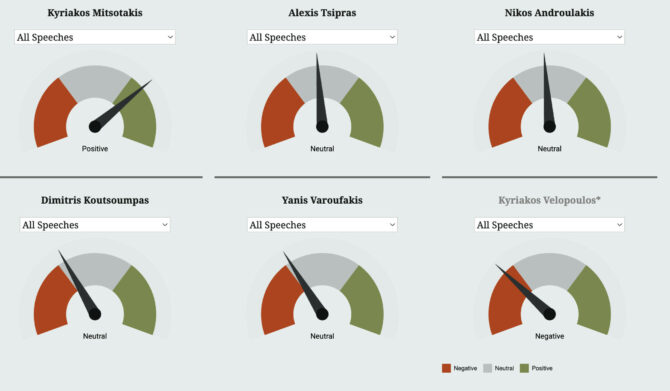An assessment of the political rhetoric used in the previous pre-election campaign period from a political science perspective. By Alexandros-Christos Gkotinakos and Eftichia Teperoglou*.
The findings from the analysis of political speeches in the first round of elections in May, 21st 2023

See the analyses of all the speeches of the leaders of the parliamentary parties before the elections of 21 May 2023.
The party leaders’ political discourse before 21 May

The political leaders’ speeches in the days leading up to the ballot box and the main conclusions we can draw about the political discourse employed during the just-ended election period.
Electoral contests are central to the functioning of liberal democratic regimes. Their outcome ushers in a change in government or confers renewed legitimacy to the incumbent. In turn, electoral campaigns are usually periods of intense partisan mobilization. Parties lay out their programmatic commitments, aiming to appeal to voters. iMedD’s present study provides a detailed description of this year’s campaign discourse, focusing on issues of populism and polarization.
The most distinct pattern relates to the government-opposition divergence in party leader sentiment. Among all parties considered, only Kyriakos Mitsotakis maintained a net positive sentiment throughout his campaign. This point is also clear when comparing the two main parties. Alexis Tsipras’ speech tone remained neutral throughout, converging towards a more positive sentiment only at the end of the campaign cycle.
This trend is uniform across all campaign issues. As the study demonstrates, 50% of Tsipras’ campaign speech was devoted to criticism of the government. By stark contrast, Mitsotakis spent only 15% of his speech on criticism and 85% on the agenda.
Other studies highlight a party-voter gap around the political center, with all parties being, on average, more ideologically extreme than their voters.
These results are even more interesting when considered in tandem with other studies documenting parties’ positions. VAA data, from both the party and voter perspective, show a substantial concentration of voters and parties across one diagonal of the two-dimensional political space, demarcating a left-libertarian/right-authoritarian polarization. More importantly, from a democratic representation standpoint, the configuration of the political space highlights a party-voter gap around the political center, with all parties being, on average, more ideologically extreme than their voters1.
One considerable virtue of iMedD’s data, in this context, is the consideration of both positions and rhetoric during the campaign. The leader of SYRIZA emphasized economic issues and employment to a far greater extent than the leader of ND. Nikos Androulakis, surprisingly, decided not to focus his campaign on issues related to illegal surveillance operations (issues of national security, transparency, and democracy). Scarce positive sentiment from Tsipras is associated with the issue of education and the social state. The few issue domains associated with some negative sentiment from Mitsotakis are related to immigration, justice, and democracy. Surprisingly, iMedD’s findings reveal the absence of European Union issues from the electoral campaign, although many other data sources demonstrate the importance of EU issues in party competition.
From a political discourse perspective at a party level, the rather affective-based polarization in Greek politics is highlighted.
While relying on ChatGPT is not without its risks and limitations, this present study, supported by a validation stage, is an important first step in computational monitoring and analysis of campaign discourse in Greece and should be extended further to the follow-up pre-election period. Overall, from a political discourse perspective at the party level, this project highlights the rather affective-based, rather than issue-based polarization in Greek politics, in line with findings from previous academic studies, while offering a new way of examining party positions and sentiment.
Most relevant, perhaps, vis-a-vis the most recent electoral contest, this study shows that polarization at the discourse level remained relatively low during the campaign. Polarization, both political (i.e. ideological distance) and affective (i.e. political out-group animosity) became staples of the political system during the crisis decade in Greek politics. While we don’t have similar data for prior campaign periods, survey studies suggest that political and affective polarization were considerably lower at this electoral period. This trend, thus, could be a first indication of the exit from the deep political consequences of the period of the economic recession, and the beginning of a new normalcy in Greek politics. Moreover, while only the elections in June could adequately answer this question, iMedD’s data will be a useful source to document trends in political discourse in Greece.
1 Rori, L. & Teperoglou, E. (2023, June 1). The position of political parties and their voters, Greek elections of 21 May 2023.Results from the What2Vote VAA (Webinar presentation). Greek elections 2023: A new era of Greek politics? Webinar, Greek Political Specialist Group. Political Specialist Group.
* Alexandros-Christos Gkotinakos and Eftichia Teperoglou are a researcher and an Assistant Professor respectively at the School of Political Sciences, Aristotle University of Thessaloniki.
